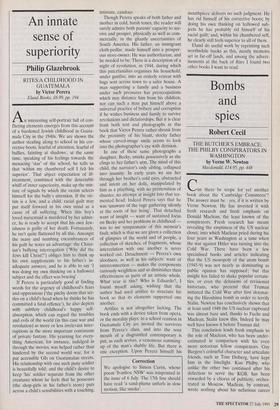An innate sense of superiority
Philip Glazebrook
RITES:A CHILDHOOD IN GUATEMALA by Victor Perera Eland Books, £6.99, pp. 194 An interesting self-portrait full of con- flicting elements emerges from this account of a burdened Jewish childhood in Guata- mala City in the 1940s. We are shown the author stealing along to school in his cor- rective boots, fearful of attention, fearful of bullies, fainting at shadows ; at the same time, speaking of his feelings towards the menacing 'star' of the school, he tells us that 'within my chambered self I felt his superior'. That abject expectation of ill- treatment, combined with the detectable whiff of inner superiority, make up the mix- ture of signals by which the victim selects himself for the bully's attention. If the vic- tim is a Jew, and a child, racial guilt may put itself forward in his own mind as a cause of all suffering. When this boy's loved nursemaid is murdered by her admir- er, he is ready to accept that his own Jew- ishness is guilty of her death. Fortunately, he isn't quite flattened by all this. Amongst the many and numbing encumbrances of his guilt he notes an advantage: the Christ- ian's bullying interrogation ('Why did the Jews kill Christ?') obliges him to think up his own supplements to his father's in- adequate answers, and he is able to say 'I was doing my own thinking on a hallowed subject and the effect was bracing'.
If Perera is particularly good at finding words for the urgency of childhood's fears and oppressions (`the pitchy doom that set- tles on a child's head when he thinks he has committed a fatal offence'), he also depicts with subtlety childhood's happy self- absorption, which can regard the troubles and evils of the world (in this case war and revolution) as more or less irrelevant inter- ruptions in the more important continuum of private fantasy. His yearning for every- thing American, for instance, indulged in through the movies, was helped rather than hindered by the second world war, for it put accessible GIs on Guatamalan streets. His relationship with one such puny soldier is beautifully told; and the child's desire to keep 'his' soldier separate from the other creatures whom he feels that he possesses (the shop-girls in his father's store) puts across a child's sensibilities with a touching, intimate, candour.
Though Perera speaks of both father and mother in cold, harsh tones, the reader will surely admire both parents' capacity to sur- vive and prosper, physically as well as com- mercially, in the ghastly uncertainties of South America. His father, an immigrant cloth-pedlar, made himself into a prosper- ous store-owner. He was authoritarian, and he needed to be. There is a description of a night of revolution, in 1944, during which this paterfamilias organises his household, under gunfire, into an orderly retreat with bags sent across town to a safer house. A man supporting a family and a business under such pressures has preoccupations which may distance him from his children; nor can such a man put himself above a universal practice of bribery and corruption if he wishes business and family to survive revolutions and dictatorships. But it is clear from both text and photographs in this book that Victor Perera rather shrank from the proximity of his blunt, stocky father whose carved-image smile seems to look into the photographer's eye with derision.
In one of these same photographs a daughter, Becky, smirks possessively as she clings to her father's arm. The mind of this child, the narrator's only sibling, collapsed into insanity. In early years we see her through her brother's cold eyes, abstracted and intent on her dolls, manipulated by him as a plaything, with no premonition of disaster, no attempt at insight into that tor- mented head. Indeed Perera says that he was 'unaware of the rage gathering silently at the roots of her being'. That detached want of insight — want of sustained focus on Becky and her problems in childhood was to me symptomatic of this memoir's fault, which is that we are given a collection of glimpses of the world and of people, a collection of sketches, of fragments, whose interrelation with one another is never worked out. Detachment — Perera's own aloofness, as well as his subjects' want of interconnection — makes the components curiously weightless and so diminishes their effectiveness as parts of an artistic whole. What year is this? Who is Eduardo?, I found myself asking, wishing that the author had used artifice to structure his book so that its elements supported one another.
Artifice is not altogether lacking. The book ends with a device taken from opera, or the morality plays: to a school reunion in Guatamala City are invited the survivors from Perera's class, and into the sour mouth of a disgruntled contemporary is put, as each arrives, a venomous summing- up of the man's shabby life. But there is one exception. Upon Perera himself his mouthpiece delivers no such judgment. He has rid himself of his corrective boots; by doing his own thinking on hallowed sub- jects he has probably rid himself of his racial guilt; and, within his chambered self, he clearly still feels superior to all of them.
Eland do useful work by reprinting such worthwhile books as this, mostly memoirs set in far-off lands, and among the advert- isements at the back of Rites I found two other books I want to read.


















































 Previous page
Previous page